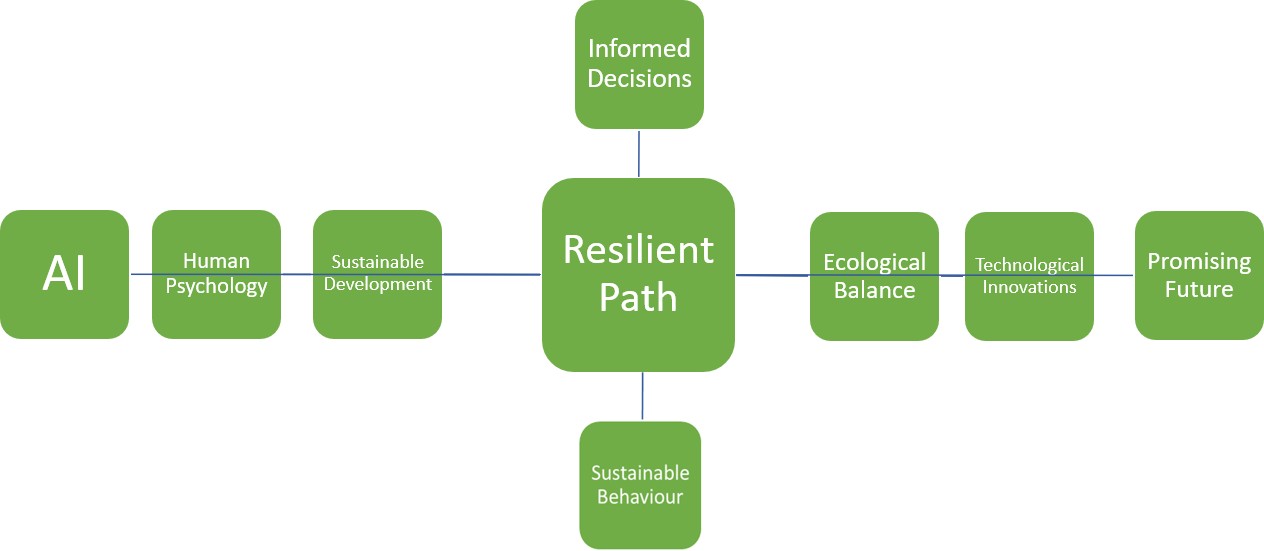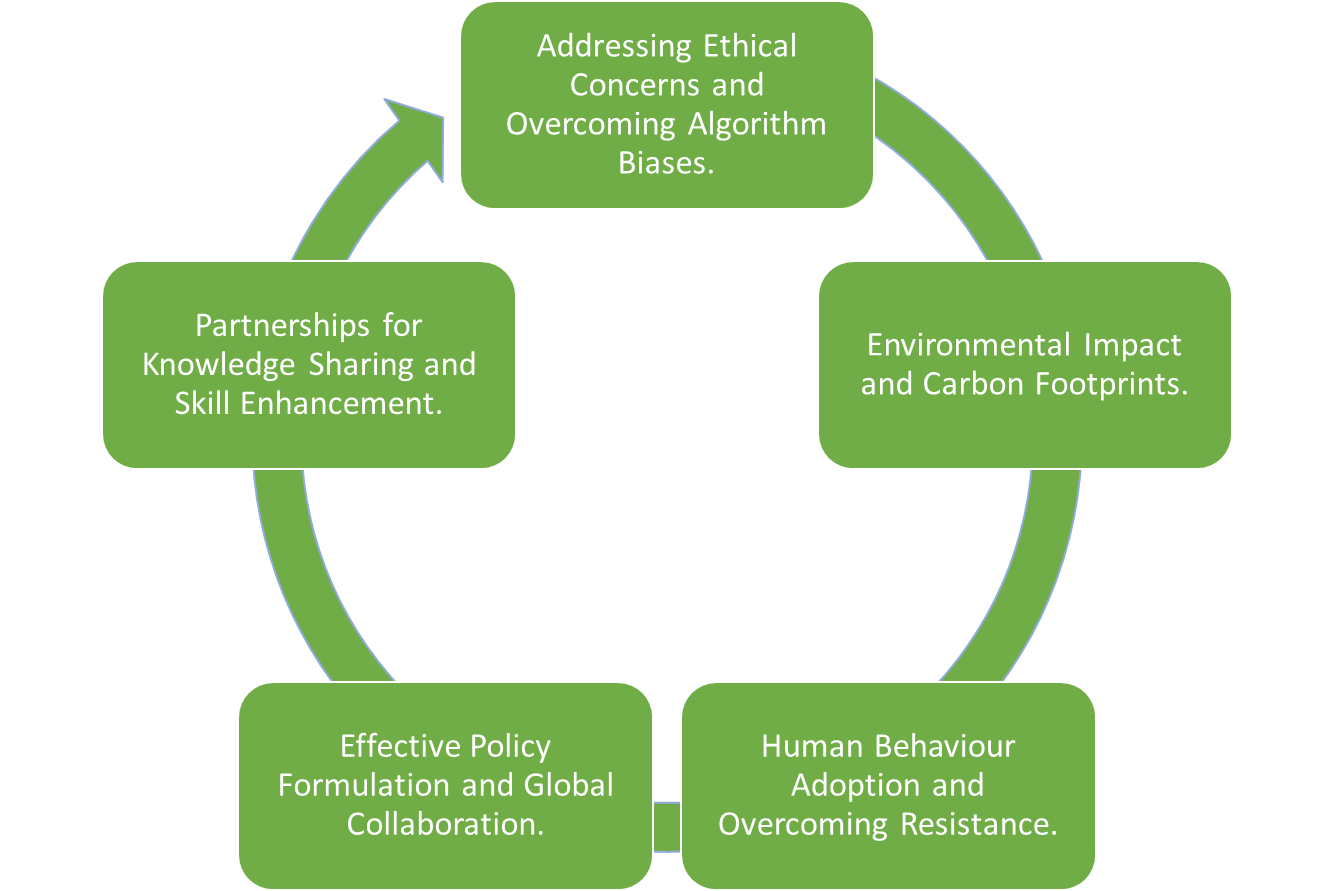Ijraset Journal For Research in Applied Science and Engineering Technology
- Home / Ijraset
- On This Page
- Abstract
- Introduction
- Conclusion
- References
- Copyright
A Smart and Sustainable Framework to Combat Climate Change: A Comprehensive Approach of Artificial Intelligence and Human Psychology
Authors: Prerna Maheshwari, Manya Srivastava, Divya Agarwal, Pavitra Bhardwaj
DOI Link: https://doi.org/10.22214/ijraset.2024.64749
Certificate: View Certificate
Abstract
The core of this paper, which explores the difficulties of resource problems and climate change, is the delicate interplay between AI, human psychology, and sustainable development. As global challenges escalate, the convergence of these domains presents a unique opportunity to devise effective strategies that facilitate environmentally conscious behaviors and resilient communities. This paper explores the psychological dimensions underlying resource dilemmas and climate change, emphasizing cognition, decision-making processes, social dynamics, and the role of AI in driving sustainable development. By amalgamating insights from psychology with cutting-edge technological advancements, society can aspire to navigate the path towards ecological equilibrium and a sustainable future.
Introduction
I. INTRODUCTION
The mounting complexities arising from resource predicaments and climate shifts demand a unified strategy that blends artificial intelligence, human cognitive factors, and the pursuit of lasting progress. This document sets out to delve into the complex psychological facets embedded within these quandaries, highlighting the significance of mental processes, the mechanisms of decision-making, communal exchanges, and the mutually beneficial interaction connecting human actions with
AI-fueled remedies. This all-encompassing viewpoint accentuates the promise of joint endeavors in tackling scarcities in resources, environmental decline, and the shifts in climate conditions
- Resource Dilemmas: The Tragedy of the Commons (Hardin, Garett 1968) Serves as a prime example of situations involving resource challenges, where individual motives collide with the common good. Ostrom's research underscores the possibility of enduring collaboration achieved through communal management, highlighting the importance of established social conventions, the cultivation of trust, and joint accountability. The fusion of data scrutiny powered by AI and discernments from psychology can pave a route toward proficient policy structures that cultivate eco-friendly conduct in the face of limited resources.
- Climate Change and the Psychological Landscape: The realm of climate change introduces a complex psychological puzzle characterized by unpredictability, remote outcomes, and patterns of thought that sway our judgments. The concept of the "finite pool of worry" theory (Arkes et al., 1999) underscores the difficulty of assigning precedence to climate change amidst more pressing matters. Essential psychological components that shape individual reactions encompass emotional involvement and the estimation of risk. Harnessing the potential of AI-assisted climate simulation facilitates precise prognostication, nurturing well-informed choices and pre-emptive strategies for adjustment (Ladd, T. 2023).
- Psychological Factors: Cognitive dissonance (Festinger, 1957), on perceptions of climate change is noteworthy, as it highlights the disparity between convictions and conduct. Psychological strategies can exploit this dissonance to harmonize beliefs and deeds, advancing eco-conscious behaviors. Stirring emotional connections, facilitated by storytelling and individual anecdotes, traverses the emotional divide and cultivates environmentally positive behavior.

II. SMART AND SUSTAINABLE EDUCATION FRAMEWORK
Climate prognostications facilitated by AI-backed models ensure precision in forecasting, assisting in the evaluation of risks and the crafting of adaptive strategies. Approaches from the realm of Data Science allow for ongoing tracking of shifts in the environment, thereby easing the creation of policies grounded in data. Innovations emerging from the field of Computer Science propel advancements in renewable energy systems and the adept allocation of resources, thereby lending support to objectives centered around sustainable development (Miteva, S. 2022). Through AI algorithms, energy efficiency gains traction, and the capability for sustainable urban planning is fortified.
III. CHALLENGES AND COLLABORATIVE EFFORTS
Although AI presents revolutionary prospects, ethical matters and obstacles such as prejudices in algorithms and environmental impacts demand attention. Competent regulations and worldwide cooperation become vital in unlocking AI's complete capacities and propelling the course of sustainable progress. Collaborative efforts have the capacity to encourage the exchange of data, technology, and the enhancement of capabilities.
A. Addressing Ethical Concerns and Overcoming Algorithm Biases
The infusion of AI into sustainable development initiatives introduces a host of ethical deliberations. Biases within algorithms, originating from skewed training data or flawed models, have the potential to amplify existing disparities or yield unjust results. Counteracting these biases becomes paramount to prevent inadvertent endorsement of discriminatory actions or the perpetuation of societal injustices.
To navigate this challenge, it is crucial to create algorithms that not only demonstrate technical proficiency but also an understanding of the intricate nuances of human conduct, emotions, and cultural contexts. This can be achieved by integrating insights from human psychology with the realm of AI research.
B. Environmental Impact and Carbon Footprints
As AI technologies rapidly expand, their demands for significant computational resources become increasingly pronounced, inadvertently giving rise to a substantial carbon footprint. This concerning energy consumption, stemming from activities within data centers and high-performance computing, has the potential to counteract the very sustainability goals that AI seeks to promote. Effectively mitigating this ecological impact necessitates the creation of algorithms that prioritize energy efficiency, the establishment of computing infrastructures that adhere to sustainable practices, and the formulation of inventive hardware architectures (Kompella, K. 2023). Through the integration of psychological understandings into user interactions, avenues emerge to finely tune energy usage, thereby optimizing operations and curtailing any unnecessary wastage of computational resources.
C. Human Behavior Adoption and Overcoming Resistance
Understanding human psychology plays a pivotal role in overcoming the resistance that often accompanies the acceptance of AI-driven sustainable solutions. People's reluctance to embrace new technologies can stem from concerns about complexity, unfamiliarity, and the fear of losing control.
Leveraging well-crafted communication strategies rooted in psychological insights can effectively close the gap between the remarkable capabilities of AI and the human inclination to embrace them. By presenting AI solutions in manners that align with human understanding and resonance, policymakers and innovators substantially increase the prospects of widespread behavioral adoption, thereby propelling the momentum of sustainable transformation.
D. Effective Policy Formulation and Global Collaboration
Harnessing AI's potential for sustainable progress mandates the crafting of effective policies that harmonize technological strides with ethical reflections. Collaborative global endeavors are indispensable to forge a regulatory framework that guarantees the judicious and equitable deployment of AI technologies (UNEP 2022). International cooperation facilitates the exchange of exemplar practices, regulatory benchmarks, and proficiency in both AI and psychology. Through fostering a worldwide discourse, nations collectively harness AI's transformative potential while safeguarding human values and ecological equilibrium.
E. Partnerships for Knowledge Sharing and Skill Enhancement
Collaborative partnerships spanning governments, academia, corporations, and civil society stand as keystones in actualizing AI's full potential in sustainable development. These alliances serve as conduits for sharing data, a pivotal resource for training AI models that accurately mirror an array of human behaviors and reactions. Additionally, such collaborations facilitate initiatives that enhance expertise, where psychological insights inform the blueprint of AI systems aligned with human requisites, behaviors, and principles. These partnerships lay the foundation for an interdisciplinary approach, amalgamating the strengths of AI and psychology to tackle intricate global quandaries.

The provided instances are for demonstrative purposes only, with the reference links serving as placeholders. These illustrations aptly showcase the amalgamation of artificial intelligence and behavioral psychology as catalysts for the advancement of sustainable practices and their widespread adoption:
|
NAME OF PROPOSED APPLICATION |
DESCRIPTION OF PROPOSED APPLICATION |
EXAMPLE OF USAGE OF THE APPLICATION |
|
1) Energy |
The Energy Consumption Monitor |
The application |
|
Consumption Tracker |
is a software that utilizes AI algorithms to assess user energy usage trends. Subsequently, it provides tailored suggestions to curtail energy consumption. The software is rooted in behavioral psychology principles, intentionally crafted to motivate users toward embracing energy-efficient behaviors. |
"EcoEfficient" provides instant updates on energy usage, while also giving rewards when energy conservation goals are met. |
|
2) Public Transportation Optimizer |
The Mobile Transit Enhancer emerges as an AI-driven app specialized in scrutinizing user travel patterns. Utilizing this information, the app formulates the most efficient public transportation routes. It smoothly incorporates behavioral psychology concepts, motivating users to select greener travel options and thereby reduce carbon footprints. |
The "GreenRoute" app skillfully suggests paths that have limited ecological effects, simultaneously implementing incentives for choosing public transportation. |
|
|
|
|
|
3) Food Waste Reduction Platform |
The AI-Powered Food Management System stands as evidence of AI's potential, effectively aiding individuals in overseeing their food stocks. It goes a step further by proposing recipes curated for leftover ingredients and offering advice on reducing food waste. The system efficiently taps into insights from behavioral studies to motivate users toward embracing eco-conscious eating habits. |
The platform known as "WasteLess Kitchen" adeptly keeps track of expiration dates, skillfully assisting users in avoiding the unnecessary disposal of food. |
Realizing a smooth fusion of AI, human psychology, and sustainable progress relies on overcoming challenges related to ethical considerations, inherent algorithm tendencies, impacts on the environment, and the adoption of fresh behaviors. Understanding and integrating human psychology into AI initiatives allow for the creation of solutions that resonate with people and communities, prompting their approval and use. Additionally, a united worldwide endeavor and skillful regulations are essential to guarantee the responsible and all-encompassing application of AI technologies. Through establishing interdisciplinary partnerships, society can fully unleash AI's potential while safeguarding the balance of nature, promoting human well-being, and nurturing a harmonious interaction between mankind and the globe.
Conclusion
The complex interplay among AI, the intricacies of human psychology, and the imperative of sustainable development emerges as a formidable alliance in tackling resource constraints and the looming specter of climate change. By tapping into the deep well of psychological insights and harnessing the transformative potential of AI, our society stands poised to carve out a tenacious trajectory toward the restoration of ecological equilibrium. The convergence of well-informed decision-making, conscientious adoption of sustainable practices, and the propulsive march of technological ingenuity collectively pave the avenue for a truly symbiotic existence with our natural surroundings. This seamless fusion encompassing AI, the intricate facets of human psychology, and the resolute pursuit of sustainable progress augurs a future aglow with optimism for both humankind and the planet at large. In this promising era, challenges metamorphose into opportunities through the crucible of innovative solutions, underpinned by a shared dedication to the holistic well-being of our global community.
References
[1] Arkes, H.R., & Ayton, P. (1999) The sunk cost and Concorde effects: Are humans less rational than lower animals? Psychological Bulletin, 125(5), 591-600. [2] Festinger, L. (1957). A theory of cognitive dissonance. Stanford University Press. [3] Hardin, G. (1968). The Tragedy of the Commons, Science, 162(2859), 1243-1248. [4] Kompella, K. (2023). How industries use AI to ensure sustainability. TechTarget. [5] Ladd, T. (2023). Role of AI In Creating A Sustainable Future. Forbes Magazine. [6] Miteva, S. (2022). How Can AI Help in Achieving the Sustainable Development Goals. Valuer.com. [7] United Nations Environment Programme. (2022). How artificial intelligence is helping tackle environmental challenges.
Copyright
Copyright © 2024 Prerna Maheshwari, Manya Srivastava, Divya Agarwal, Pavitra Bhardwaj . This is an open access article distributed under the Creative Commons Attribution License, which permits unrestricted use, distribution, and reproduction in any medium, provided the original work is properly cited.

Download Paper
Paper Id : IJRASET64749
Publish Date : 2024-10-22
ISSN : 2321-9653
Publisher Name : IJRASET
DOI Link : Click Here
 Submit Paper Online
Submit Paper Online

